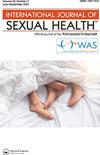性态度在网络性行为与问题色情使用之间的调节作用:来自华人社区和求助男性的证据
IF 2.1
4区 医学
Q2 PSYCHOLOGY, CLINICAL
引用次数: 0
摘要
摘要:目的探讨性态度在中国网络性活动(OSA)与问题色情使用(PPU)之间的调节作用。具体来说,我们研究了源于态度的不一致(即不赞成非婚性行为和随意性行为,但参与OSA)是否会放大PPU的感知。结果性态度调节了两个样本中OSA与PPU之间的关系,态度相对宽松的个体(高于性态度平均值1个标准差)OSA对PPU的预测作用减弱,态度相对保守的个体(低于性态度平均值1个标准差)OSA对PPU的预测作用增强。结论在中国保守的性文化背景下,相对保守的性态度可能会加强OSA与PPU的关系。关键词:网络性行为(OSA)问题色情使用(PPU)性态度保守文化背景机构审查委员会声明本研究依据赫尔辛基宣言进行,并经福州大学应用心理学系伦理委员会批准(协议代码:20220105)。利益声明作者报告无利益冲突。作者独自负责论文的内容和写作。数据可用性声明本研究中提供的数据可向通讯作者索取。本研究得到国家社会科学基金资助[批准号:19BSH117]。本文章由计算机程序翻译,如有差异,请以英文原文为准。
Moderating Role of Sexual Attitudes in the Association between Online Sexual Activity and Problematic Pornography Use: Evidence from the Chinese Community and Help-Seeking Men
AbstractObjectives This study aimed to investigate the moderating role of sexual attitudes in the association between online sexual activity (OSA) and problematic pornography use (PPU) in the Chinese context. Specifically, we examined whether incongruence stemming from attitudes (i.e., disapproval of nonmarital and casual sex but engaging in OSA) amplifies the perception of PPU.Methods We recruited two samples of Chinese men, one from the community (N1 = 525) and the other comprising help-seeking individuals (N2 = 578).Results Sexual attitudes moderate the relationship between OSA and PPU in both samples, with the predictive influence of OSA on PPU weakening among individuals with a relatively permissive attitude (scored one SD above the mean of sexual attitudes), and strengthened among individuals with a relatively conservative attitude (scored one SD below the mean of sexual attitudes).Conclusions In the conservative sexual cultural context of China, a relatively conservative sexual attitude might strengthen the association between OSA and PPU.Keywords: Online sexual activity (OSA)problematic pornography use (PPU)sexual attitudesconservative cultural context Institutional Review Board StatementThe study was conducted in accordance with the Declaration of Helsinki and approved by the Ethics Committee of Department of Applied Psychology, Fuzhou University (protocol code: 20220105).Declaration of interestThe authors report no conflicts of interest. The authors alone are responsible for the content and writing of the paper.Data availability statementThe data presented in this study can be requested from the corresponding authors.Additional informationFundingThis work was supported by the National Social Science Foundation of China [Grant No. 19BSH117].
求助全文
通过发布文献求助,成功后即可免费获取论文全文。
去求助
来源期刊

International Journal of Sexual Health
Multiple-
CiteScore
3.00
自引率
20.00%
发文量
33
期刊介绍:
As the official journal of the World Association for Sexual Health, the International Journal of Sexual Health promotes sexual health as a state of physical, emotional, mental, and social well-being through a positive approach to sexuality and sexual rights. The journal publishes peer-reviewed scientific papers, editorials, and reviews, using quantitative and qualitative methods, descriptive and critical analysis, instrument development, surveys, and case studies to examine the essential elements of this broad concept. Leading experts from around the world present original work that covers a variety of disciplines, including sexology, biology, medicine, psychology, sociology, anthropology, history, and religion.
 求助内容:
求助内容: 应助结果提醒方式:
应助结果提醒方式:


